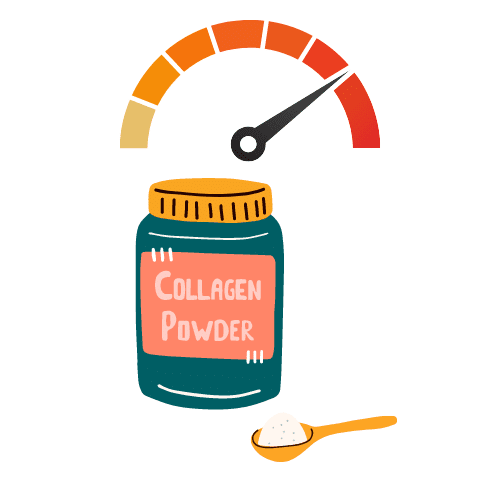Beauty and health trends nowadays are all about collagen supplements. They work wonders for your health and skin, acting as antioxidants and fighting against free radicals.
But like everything else, too much of anything can cause health detriments. These are some of the things you might expect as too much collagen symptoms and how they will manifest.
So, we are here to help you find answers to all the questions you have about collagen. That includes the types of collagen, its effect on your body, and what might happen if you take too much of it.
What Is Collagen?
Collagen is the most abundant and main structural protein in our body. It is the main component of our connective tissue. These peptides make up connective tissues and can be found in muscles, bones, blood vessels, tendons, and skins. It gives our skin elasticity and strength.
There are two types of collagens: exogenous and endogenous. Endogenous collagen occurs naturally in our body, but endogenous collagen comes from dietary intake.
Collagen has many health benefits, so a lot of people take collagen supplements with their everyday diet.
Too Much Collagen Symptoms

Taking more collagen than your body needs will cause hazardous symptoms and side effects, and some of these are mentioned below.
Systemic Scleroderma
It is an autoimmune disease where your immune system attacks your body. Unrestricted accumulation and production of collagen cause Scleroderma.
People with systemic Scleroderma suffer from pains in several body joints, difficulty swallowing, and skin tightening. You might also suffer from contraction, stiffness in fingers, swelling, and heartburn. If it reaches their heart, lung, or kidney, it might end in death.
Hypercalcemia
Taking too much collagen can increase your risk of suffering from hypercalcemia. The state of having too much calcium in your body is called hypercalcemia.
A higher amount of calcium in your body will cause weakened bones, kidney stones, and heart and brain function obstruction.
Bloating and Upset Stomach
Too much consumption of collagen proteins causes bloating in some people. This leads to weight loss, changed bathroom habits, fatigue, constipation, and altered appetite.
Untreated bloating might result in high fever, painful and tender pelvic area, and unknown discharge.
Kidney Stones
If you are susceptible to getting kidney stones, you should not take collagen. It might accelerate the production of stones in the human body.
Allergic Reaction
Taking too much collagen cause allergic reaction in some people, such as wheezing, eczema, and hives. So, people should be careful about potential allergen-containing collagen to prevent any allergic reaction.
Arrhythmia
If you take more than the recommended amount of collagen, you will suffer from an irregular heartbeat.
People with heart arrhythmia might face complications such as heart failure, stroke, and sudden death.
Decreased Appetite
If you take more than enough collagen supplements for your balanced diet, you will feel full for a long time which will cause your appetite to become suppressed.
When you do not have an appetite, you will not feel like eating even when your body needs it. So, you will become malnourished, which will lead to complex diseases.
Increased Body Mass
Collagen is a protein, and it will increase your muscle mass. But if you do not exercise after its consumption, you will become overweight and ultimately obese.
So, you should take the recommended amount of collagen supplements when your body needs them and not a bit more. Otherwise, you will have to suffer from many harmful consequences.
Collagen Nutritional Value
As we said, collagen is a protein. In every 50 grams of collagen, there are 12 grams of protein and no fats, carbohydrates, sugars, or fibers.
Types of Collagen Supplements
Some commonly found collagen supplements are:
Hydrolyzed Collagen
Hydrolyzed collagen peptides are obtained from cattle, poultry, pigs, marine, and other animals.
Undenatured Collagen
These collagen supplements are acquired from chicken cartilage.
Gelatin
Gelatin is the cooked type of collagen. They are mainly procured from different kinds of animals.
Collagen Health Benefits
There are many scientifically proven and some less understood benefits of collagen. So, here are some of the health benefits of collagen supplements:
Stronger Bones
Cell production rate decreases as you get older, making your bone weak and brittle. Brittle bone breaks very easily. Bones damaged in older age take a long time to heal. There is even a chance that it will never heal properly.
All of these lead to immense bone pain. As a solution and prevention, you should take dietary collagen. Collagen peptides will make your bones denser, decrease their brittleness, and increase the healing rate.
Skin Hydration
Many people get dry skin even if they hydrate their body frequently, and no amount of medication gets rid of this problem.
Consuming hydrolyzed collagen as a dietary supplement can get rid of this issue. They will replenish your skin and make it hydrated and soft.
Skin Elasticity
As a person ages, their skin starts to lose elasticity, and their skin becomes loose and droopy. They get a much more prominent double chin, and their wrinkle lines begin to show.
However, taking collagen hydrolysate as a dietary supplement can improve skin elasticity and wrinkles by maintaining sturdy connective tissues.
Thicker Hair
Men go bald, whereas women get thinning scalps. This could happen for many reasons, such as aging, hormonal issues, lacking nutrition, or the climate.
It was found in a study that taking collagen supplements has improved hair quality and quantity in women with a thinning scalp.
Healthier Nails
Many people have fragile nails which break very easily. And when broken, it takes a much longer time to regrow than other people.
Women who went through collagen supplementation for four weeks straight found that their nails became stronger and less brittle and regrew fast.
Decreased Osteoarthritis Pain
Osteoarthritis is more evident in older people. It causes joint pain, stiffness, tenderness, lessened flexibility, sharp sensation, spurs, and swelling in your bones.
Taking collagen supplements for 12 to 20 weeks continuously relieves the pain caused by osteoarthritis and improves your joint health.
Improved Muscle Mass
Regular consumption of collagen peptide supplements can increase your muscle mass and strength. But you must do strength training along with it.
You can find many other health-beneficial functions of taking collagen if you practice restraint in your collagen consumption.
How Much Collagen Supplement You Should Take?
The recommended amount of how much collagen you should consume varies depending on your reason.
You should take 1 to 3 scoops of collagen peptides daily, not more than that. Here is the breakdown of each scoop amount.
For Skin
If you want to take collagen to improve your skin quality, you should take 11 grams in each scoop.
For Cellulite
It is better to take 11 grams of collagen peptides to decrease the appearance of your body’s cellulite.
For Muscle
If your goal is to increase muscle mass, you should not take more than 15 grams for every scoop.
For Bone Health
Take 11 grams in each of your scoops to increase your bone health.
Even with these suggestions, it will be better for you to see a specialist to decide what the amount should be for your daily collagen intake.
Healthier Alternatives
Your body makes enough collagen for you to lead a healthy life. But for the human body to make collagen, the diet must be changed.
Glycine and proline, two non-essential amino acids, interact with vitamin C, copper, and zinc to produce your body’s collagen.
So, you should eat foods rich in glycine, proline, vitamin C, copper, and zinc. Some are beef, chicken, fish, eggs, dairy beans, citrus fruits, leafy green, tomatoes, shellfish, whole grains, and nuts. You could also try drinking bone broth which is a plentiful protein food.
If your body makes sufficient collagen, you do not need to take a collagen supplement.
Key Takeaways
Now that you know all about the symptoms of taking too much collagen, it is time for you to decide whether or not you want to start taking it.
However, to be on the safe side, eating foods that help your body make sufficient collagen for its needs would be better instead of taking collagen supplements. In this way, you are getting the collagen and nutrition too.
Disclaimer: this article does not constitute or replace medical advice. If you have an emergency or a serious medical question, please contact a medical professional or call 911 immediately. To see our full medical disclaimer, visit our Terms of Use page.
Related Articles
Best Collagen Supplements For Women
Does Collagen Help With Hair Growth?








